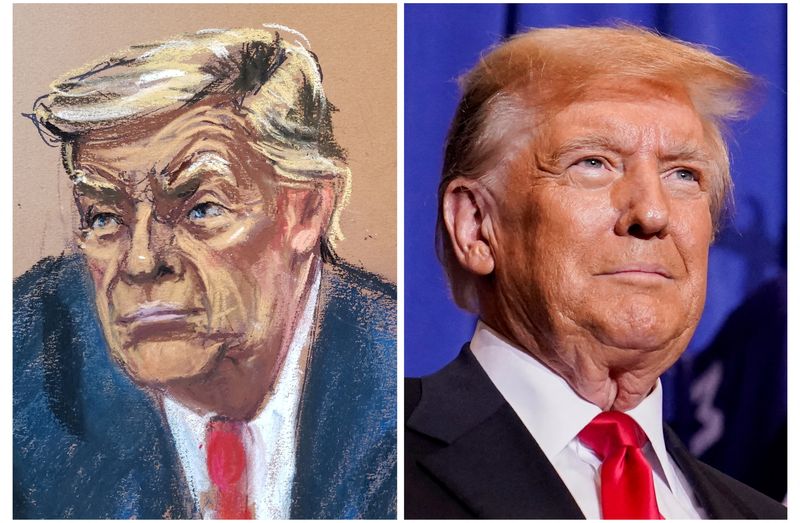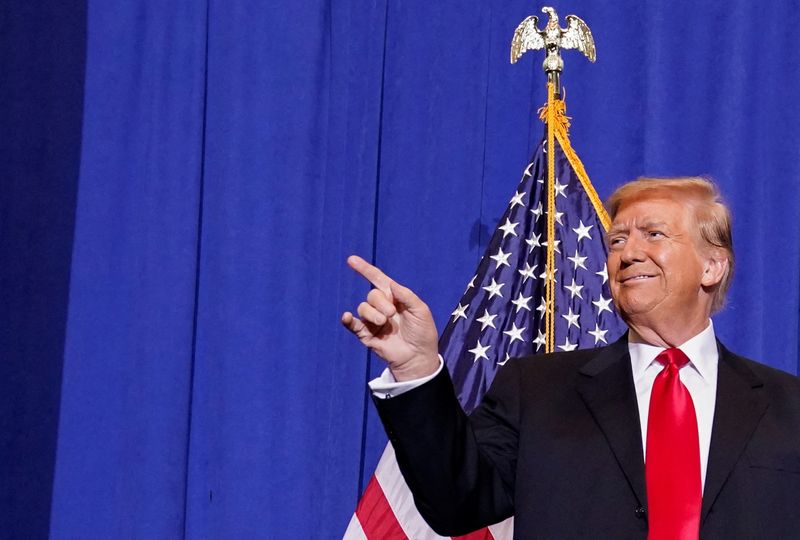By James Oliphant and Gram Slattery
ATKINSON, New Hampshire (Reuters) - Donald Trump's schedule on Wednesday summed up the unprecedented nature of this year's election: spend the day in court fighting a defamation case and the evening rallying supporters in his bid to become the next U.S. president.
That is how the former president, the frontrunner for the 2024 Republican nomination and the world's most famous defendant, has chosen to divide his time this week as he pursues his political comeback.
Trump was not obliged to be in the federal courtroom in Manhattan, where a judge warned him he could be kicked out if he was disruptive. His appearances for the civil court case are entirely voluntary.
From there, he planned to spend Wednesday evening on the campaign trail in New Hampshire ahead of the state's Republican presidential primary next week.
It is an unusual strategy for an extraordinary situation: a major presidential candidate trying to win the White House while facing a fusillade of federal and state criminal charges, as well as the civil defamation trial and a civil fraud trial.
But Trump and his campaign are keenly aware of the publicity and sympathy his court appearances can generate with his loyal base of supporters while he attempts to stave off challenges from Republican rivals Nikki Haley and Ron DeSantis.
“Nobody else can take this crap," Trump said to the hundreds of people who had lined up in blowing snow and pelting ice outside a country club in Atkinson, New Hampshire, on Tuesday night to see him.
The crowd burst into sustained applause.
Trump faces dozens of federal and state charges related to attempts to undermine the 2020 election as well as a federal prosecution for mishandling classified documents. He has denied any wrongdoing and pleaded not guilty to the criminal charges, contending that the cases are politically motivated. The Justice Department says it acts without political bias.
The federal case Trump is attending this week is a civil one, the damages phase of the defamation trial for writer E. Jean Carroll, who claims Trump destroyed her reputation and should pay millions of dollars in damages for denying in 2019 that he had raped her nearly a quarter of a century earlier.
At his rally in Atkinson, he griped about the dual commitments.
“Nobody’s ever had to do this before,” he said. “These people are disgraceful.”
SPLIT SCREEN
The day after a resounding win on Monday in Iowa, where he trounced both DeSantis and Haley by about 30 percentage points in the state's first-in-the-nation caucus, Trump could have taken a victory lap around New Hampshire. Instead, he took a seat in the New York courtroom to observe jury selection in the defamation case.
He didn’t leave the federal court building in lower Manhattan until midafternoon, posting on his Truth Social platform that he should have been in New Hampshire but “had to spend time in a Federal Courthouse with a Trump Hating, Radical Left Judge.”
His supporters, meanwhile, waited for hours in storm-tossed New Hampshire after Trump’s plane was delayed by the weather.
“We froze our rear ends off trying to get in here!” said Phil Caron, 81, who had come from neighboring Massachusetts.
It was the first Trump event for Cat Wiggins, 51, from Hampton, New Hampshire. She didn’t mind waiting.
“I am totally stoked,” she said, adding that she was on Trump’s side with regard to his legal woes. She said the 2020 election, which Democrat Joe Biden won, was “stolen.”
Trump took the stage two hours late, regaling the crowd with how difficult it been there to get there. His flight was a perilous one, he said, and the pilot had urged him not to go amid heavy snow and the high winds.
“This was a little rocky tonight,” he said and then suggested that he might not have made it to his rally at all. “That would have been a pretty big story, right?”
It was the kind of tale the former president loves to tell on the campaign trail, embellished for dramatic effect, casting himself as the stalwart hero braving obstacles for his devoted fans. They ate it up.
The E. Jean Carroll defamation trial will stretch at least until next week, with Trump intending to shuttle between New York and New Hampshire as he campaigns ahead of the primary on Tuesday.
The ping-pong travel pattern is likely to repeat throughout the election year.
Trump's federal trial in Washington related to the election charges is scheduled to start on March 4, the day before Super Tuesday, when 16 states and one U.S. territory hold Republican nominating contests.
A New York state case in which Trump is charged in connection with hush money payments to a porn star comes in late March. The federal classified documents trial in Miami is scheduled for May.

Trump aims to have the Republican nomination wrapped up by then. He is expected to face a greater challenge from Haley in New Hampshire, with its mix of moderate and independent voters, than he did in Iowa. But he remains the favorite in the Republican primaries to come.
Until then, he apparently hopes to use his time in courtrooms to his full advantage.
